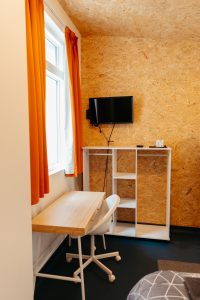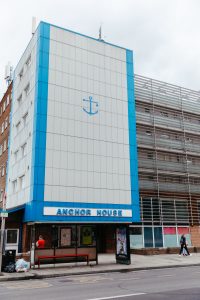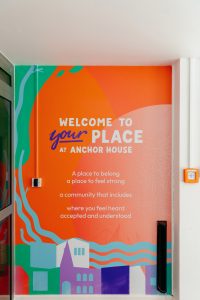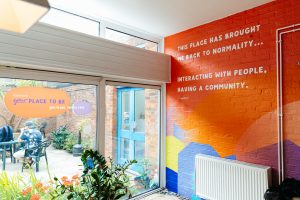In this new blog series, Becky Rice, LHF Atlas Manager, is taking a closer look at services that are outside the average in one or more ways! This first blog takes a look at a very large accommodation service within a small organisation in a unique area – Your Place in Canning Town, Newham.



One of the insights from the Atlas Infographic tab, is how much of London’s homelessness accommodation is delivered by organisations that have just one or two services, and are not part of a larger London delivery organisation such as St Mungo’s or Look Ahead.
One such organisation is Your Place, and its hostel at its building – Anchor House. The service is unusual in other ways too:
- The hostel is unusually large by today’s standards consisting of 155 spaces in one building. 115 are in the core hostel, with a further 25 self-contained move-on flats, as well as 15 independent units in their Hope Street service which opened last year to provide additional accommodation for people who have slept rough. The average size of an accommodation service in the Atlas is around 40 (this includes single site services only).
- The service is exceptionally diverse in terms of nationality and ethnicity, reflecting its location in what the 2021 census found to be the most ethnically diverse area of England.
- The project provides accommodation and support for people with a wider range of support needs in one location, from those who are working and need accommodation while they prepare for a rapid move into the private rented sector, to those who have longer homelessness histories and will need support for a longer period.
I met with Amanda Dubarry, CEO of Your Place, to hear more and have a look around…
Your Place has been through a transformation over recent years. Until late 2022, Your Place was known as Caritas Anchor House. Over 60 years they’ve evolved from an east London charity with a specific maritime mission into a growing, organisation with an ambitious, far-reaching purpose: to solve homelessness, one person at a time. The building is owned by Your Place, having been donated by the Catholic Church some 30 years ago. Some of the key changes are:
Resident profile
Commissioned to provide ‘low to medium support’, since 2017 the service has increasingly taken on a role in supporting those experiencing more complex needs. This is in recognition that the profile of those rough sleeping in the area had higher support needs than local services were responding to, and Your Place now has an Intensive Support Service for those with higher support needs.
The staff team have different roles to help cater for different groups of clients – for example, more intensive staffing is provided for 21 residents within their Intensive Support Service, of which 15 spaces are commissioned via London Borough of Newham, and a further six spaces are for migrants facing complex situations via St Mungo’s Routes Home and Street Legal Service.
Their services and staff team cover person-centred support relating to basic needs, life skills, housing, health and wellbeing, training, employment, move-on and sustaining long-term tenancies. Each person who stays here receives one-to-one and peer-led support, empowering them to meet their unique needs and goals.
They have a dedicated Job Coach to support those who are looking for work or training and education, and people are provided with lower service charges to help make work more viable. Residents work with their Job Coach on personal training needs analyses, and can access varied courses including CSCS and ESOL (English for Speakers of Other Languages), digital skills and their IT suite, as well as community engagement and volunteering opportunities to build or expand upon interests, activities and knowledge. A wide range of ‘in reach’ sessions from local organisations also helps the team meet the needs of the diverse client group.
Refurbishment
The building has been refurbished in stages over the last few years with fundraising done for each new project before it commences. These changes are guided by resident feedback, the values of the organisation and models of creating psychologically informed environments. Some of the key considerations are creating a place people can be safe, a place to belong, and a supportive community.
One of the first things Amanda was involved in redeveloping was the food and cooking facilities. She explained “when I spoke to people and asked them what the one thing they would change if they were in my role – about 85% of them said they wanted to be able to cook for themselves”.
As retaining rooms was a priority in the face of homelessness levels in the area, it was decided that a very large kitchen would be created for residents on the ground floor rather than the smaller kitchens found on each floor of many hostels.
The large kitchen is cleaned each night when it closes for a few hours, and fridge and cupboard space is allocated for all residents. When we had a look round, someone was preparing some fruit, another person was frying vegetables, and the cupboard we had a peek in had tins of veg and food from around the world; a healthy advance on the limited choices and cooked breakfasts previously provided!
Alongside the kitchen refurb was the creation of a laundry room where the small former kitchen had been. For a pound residents can access a wash with detergent, and drying in a large load machine. This is something that makes a huge difference to residents lives when previously they had to rely on friends and family or sometimes prohibitively expensive laundrettes.
In addition, the large lounge area was redeveloped to create smaller spaces within the room, areas to read, relax, play pool and chat. The reception area has had a recent facelift and provides a clean and bright welcome to the service.
Hope Street
Until recently, adjacent to the main hostel was a very large space, similar to a warehouse, which had been used and disused over time but never fully reached its potential.
Just over a year ago in March 2022, Hope Street – a new innovative 15 room accommodation project – was opened in the space for modular homes. Services can often feel institutional, and so the design of the project was very different. The architects and Your Place wanted to create the sense of a street of unique homes with each room designed to empower its residents to feel a sense of ownership of both their home and their environment. And the service was named by residents, reflecting their feelings when they stay there.
The future
Your Place has been developing apace in recent years and is looking into new opportunities all the time. Some priority areas include development work to ensure the best outcomes possible for women, young people with complex needs, and those with restricted eligibility to public funds and other immigration issues. The organisation has already secured funding for a women’s development worker and this role is seeing outcomes including greater participation and leadership from women residents in coproduction projects.
In the external environment, the level of need in the borough is growing, as illustrated by the latest CHAIN figures presented in the Atlas, and at the same time boroughs including Newham are under huge financial pressure. In 2021/22 578 people were contacted rough sleeping by outreach teams in Newham, an increase on 503 the previous year, and the 5th highest borough figure in London for both those years.
While there are challenges, financial and operational, some of London’s larger hostels such as Your Place’s Anchor House site provide vital capacity, and are innovating and diversifying to ensure a personalised and individual approach, at scale.


Thank you very much to Amanda and the team for your hospitality…
To find out more about Your Place visit www.your-place.uk. To explore the profile of small organisations, larger accommodation projects, and accommodation by borough, you can do this on the Atlas Infographic. For more information about Newham check out the borough focus tab.
To provide comments, corrections and ideas to the Atlas team contact becky.rice@lhf.org.uk or gareth.thomas@homelesslink.org.uk